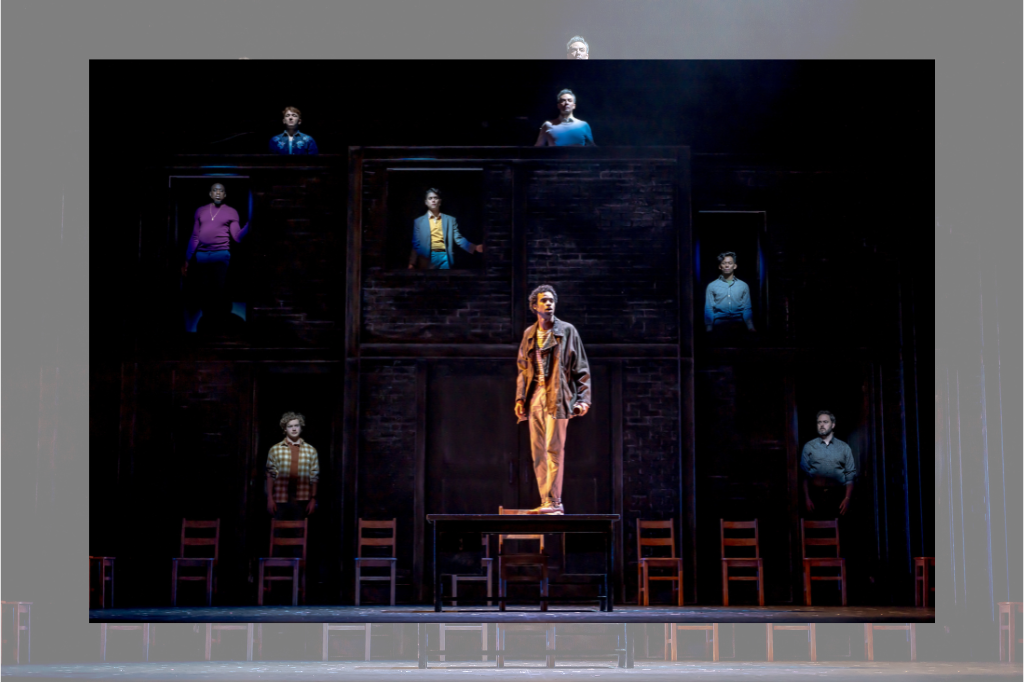REVIEW: Run, don’t walk to Canadian Stage’s luminous production of The Inheritance
“You can’t ask an audience to sit through a play that long!,” exclaims a literary agent, poring over a chaotic playscript in Part Two of The Inheritance.
It’s one of dozens of instances of meta-humour in Matthew López’s opus, a sprawling epic informed by Howards End and written in two parts that play out over six hours. Canadian Stage is no stranger to the two-part theatregoing experience – folks might wearily recall the same structure in last year’s Fall On Your Knees – but this time around, The Inheritance zips by at a vital, exhilarating pace. The six-hours-ness of it all scarcely comes to mind while soaking up this rending, bleeding story of love, loss, and hope for the future.
So what is it that’s being inherited, exactly? Given the play’s length, you’d be right to expect a swath of pointillistic plots that unfurl adjacent to one another, binding together in the second part’s final beats to create a cohesive story. In one timeline, the inheritance is a house in upstate New York, a safe haven for the dying. In another, the inheritance is a literary estate, left behind in a blaze of self-hatred and regret. In another, it’s a rent-controlled apartment. In still another, it’s HIV, passed between gay men alongside packets of coke and crystal meth.
This diverse network of plots filters primarily through six men: Eric and Toby, in their early 30s; Walter and Henry, in their retirement years; and Adam and Leo, just over the threshold of adulthood. The connections between these men are complex and volatile, imploding and rebuilding over a series of couplings, uncouplings, and encounters with death.
When we meet Eric the activist and Toby and playwright, they’re on the cusp of matrimony, happy and successful in their relative pursuits. One by one, the remaining central characters enter their lives, testing and squelching Eric and Toby’s relationship in unique ways: Adam is tantalizingly young, the object of obsession for a self-loathing Toby. Walter is painfully kind, a vital balm for the ache of a scorched-earth breakup for Eric. Leo is homeless and desperate, a piercing reminder of what’s been lost for both Toby and Henry.
That’s a lot to take in. But thanks to director Brendan Healy’s delicate, tender handling of López’s effortless prose, the story washes over the audience like a baptism, guiding its audience from moment to moment with care. The Inheritance makes frequent use of narration in its dialogue – Eric and his colleagues often introduce lines with “Eric says,” for instance, and actions with “Eric does.” There’s a point to be made through this device about the loss of personal agency, and it works, especially in the context of the HIV that features so prominently in Eric’s world.
Healy’s reverence for that world, made physical on an extraordinary, weathered set by Michael Gianfrancesco, shimmers through the work – and the actors Healy has trusted to bring these lives to life are top-notch, sure to leave June’s Dora Awards with sacks of trophies.
Qasim Khan brilliantly leads the way as Eric, draped always in curiosity and kindness towards those around him. Khan’s Eric could be your best friend, the mother hen entrusted with preparing brunch on Sunday morning. Alongside him is Antoine Yared as Toby, whose erratic and easily dinged self-esteem weighs down his entire body. Yared’s physicality is fascinating and superb, richly considered in each chapter of Toby’s life. Daniel MacIvor (yes, that one) plays both Walter and E.M. Forster, older men who frame the sine wave of Toby and Eric’s tumultuous love story with narrative meaning. And Jim Mezon plays Henry, a – gasp – Republican, with a masterful blend of empathy and sharp edges.
It’s Stephen Jackman-Torkoff who’s tasked with the most emotionally heavy and physically taxing demands of the show. As Adam, they play a young ingenue, a theatre star who’s the talk of the town following their Broadway debut. In this way, Adam and Jackman-Torkoff are dizzyingly similar, bright talents ready to turn a local theatre industry on its head with sheer craft alone.
But as Leo, Jackman-Torkoff has to embody a lifetime of abuse, both self-inflicted and external. At times, Jackman-Torkoff must juggle the roles of Adam and Leo in close succession, even having a conversation with themself in a sequence that defies belief – the technique is just astounding. It’s not news that Jackman-Torkoff is one of the sparkling crown jewels of Canadian theatre, but to see them flex their talent with such grace in these opposing roles feels like a once-in-a-lifetime theatrical experience.
Additional standouts in The Inheritance include Gregory Prest, who plays everyone from Toby’s agent to one of Henry’s sons, and Breton Lalama, who plies The Inheritance with many of its punchiest jokes. Louise Pitre is used oh-so-sparingly – and to reveal how would be to spoil in the extreme – but her lengthy monologue is one of the most touching moments in a show drenched with touching moments, and prompts Gianfrancesco’s set to perform one final magic trick before the play’s epilogue.
Hot on the heels of another star-studded mega-production in Toronto, The Inheritance is a powerful, gorgeous offering from Canadian Stage, one I hope earns just as many extensions and as much acclaim as its musical predecessor. Believe the buzz, and fear not a lengthy runtime: it is so, so worth it.
The Inheritance runs at the Bluma Appel Theatre until April 14. Tickets are available here.
Intermission reviews are independent and unrelated to Intermission‘s partnered content. Learn more about Intermission‘s partnership model here.















Comments